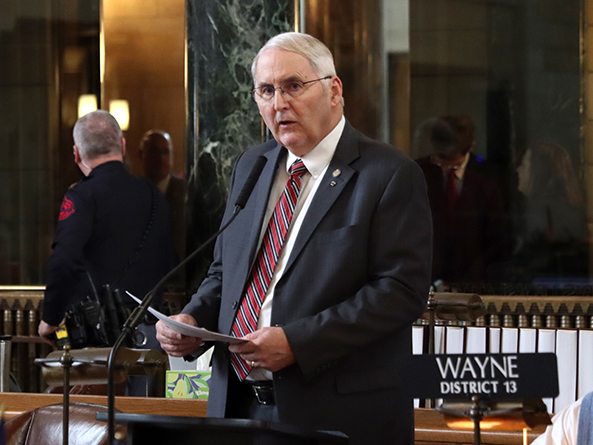Inheritance tax phaseout debated
Lawmakers continued first-round debate this week on a proposal to phase out the inheritance tax collected by Nebraska counties while partially reimbursing them for housing state prisoners.

Under current law, immediate relatives pay a 1% tax on the clear market value of property over $100,000 received by each person. Remote relatives pay 11% on inheritances of more than $40,000, and all other beneficiaries pay 15% on inheritances of more than $25,000.
Under LB1067, introduced by Sen. Robert Clements of Elmwood, the rate that applies to immediate relatives would fall incrementally each year, beginning in 2025, until reaching 0% in 2028. The rates that apply to distant relatives and others would decrease each year beginning in 2024, and also would reach 0% by 2028.
Clements said the inheritance tax makes Nebraska unattractive to retirees and is paid by a relatively small number of people, roughly 40% of whom live outside the state.
As introduced, the bill would offset a portion of counties’ revenue loss by requiring the state Department of Correctional Services to reimburse counties $35 per day for each state prisoner housed in a county jail. Beginning with fiscal year 2024-25, the total annual appropriation for reimbursing county jails could not exceed $3.9 million.
A pending Revenue Committee amendment would increase the reimbursement to $100 per day.
Omaha Sen. Justin Wayne introduced an amendment that would require the state to reimburse counties for 25% of their actual costs to house state prisoners in fiscal year 2024–25, 50% in FY2025-26 and 100% beginning in FY2026-27.
If prisoners are held in county jails for violating state law, Wayne said, the state should cover the entire cost, which he estimated at $140 million per year.
As introduced, LB1067 also would have allowed a county’s governing body to use the proceeds of two funds intended to promote tourism and improve visitor attractions for other purposes. Under the committee amendment, they could use only up to 50% of the proceeds.
An amendment offered by Clements, adopted 40-0, would remove those provisions. He said counties spend most of their tourism funds, leaving little to offset lost inheritance tax revenue, as originally intended.
Clements said he and other senators were working to find additional ways to replace the estimated $12 million in inheritance tax revenue counties would lose in the first year of the bill’s implementation.
Sen. Lou Ann Linehan of Elkhorn, chairperson of the committee, supported LB1067, saying most counties have robust reserves and could adjust to the gradual inheritance tax phaseout. She said the tax is “mean” and “unfair” because it applies to money and property that already has been subject to income and property taxes.
“You pay taxes your whole life, and then, when you die, your heirs pay taxes again,” Linehan said. “It’s just wrong.”
Seward Sen. Jana Hughes said she agrees that the tax is unfair but that eliminating it would leave counties with no “viable alternative” to pay for emergencies and unexpected expenses other than increasing property taxes, their only other source of revenue.
“I’m not in favor of eliminating one tax to replace it with another, especially if it runs counter to our efforts to lower our property tax[es],” she said.
Sen. Jane Raybould of Lincoln opposed LB1067, saying counties use inheritance tax proceeds to buy emergency equipment, repair damaged infrastructure and pay for unfunded state and federal mandates.
When fully implemented, she said, the bill would reduce county revenues by approximately $120 million per year, forcing them to cut programs and services or raise property taxes to pay for them.
The Legislature adjourned before voting on the pending amendments or the bill. LB1067 remains on general file.


